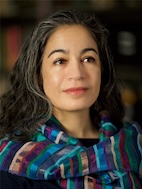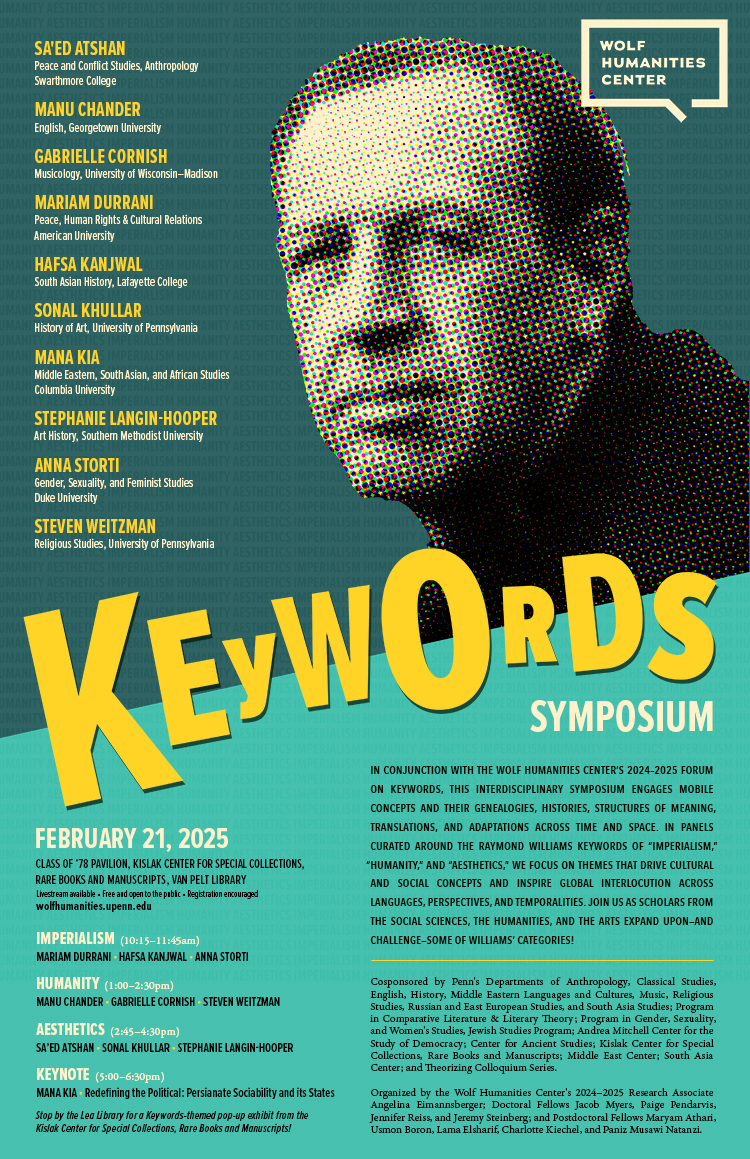Welcome Remarks
 Jamal J. Elias is the Director of the Wolf Humanities Center, Walter H. Annenberg Professor of the Humanities, and Professor of Religious Studies at the University of Pennsylvania. He specializes in Islamic thought, literary and visual culture as well as history in Western and South Asia. His current research focuses on processes and understandings of religious community formation from the medieval to the modern world, as demonstrated in historical and literary writing as well as in visual and material culture. His most recent book, After Rumi: Language, Kinship and the Making of a Religious Community, is forthcoming from Harvard University Press. He is also the lead investigator on a project entitled "Art and Islam in Society: Aesthetic Cognition Expanding Religious Meaning," funded by the Templeton Religion Trust. Elias regularly teaches courses in his areas of specialization, on Islam and modernity and on comparative religion, as well as advanced graduate courses in Sufism, Religion and Visual Culture, Qur'anic Studies, and in Persian and Turkish religious literature. He is the author of Alef is for Allah: Childhood, Emotion and Visual Culture in Islamic Societies (Berkeley 2018); Aisha's Cushion: Religious Art, Perception and Practice in Islam (Cambridge, MA 2012); On Wings of Diesel: Trucks, Identity and Culture in Pakistan (Oxford 2011); This is Islam: From Muhammad and the Community of Believers to Islam in the Global Community (Great Barrington 2011); Islam (London 1999); The Throne Carrier of God: The Life and Thought of ‘Ala’ ad-dawla as-Simnani (Albany 1995); the coauthor of Interpreting the Self: Autobiography in the Arabic Literary Tradition (Berkeley 2001); the editor and translator of Death Before Dying: Sufi Poems of Sultan Bahu (Berkeley 1998); the editor of Key Themes for the Study of Islam (Oxford 2010); the coeditor of Light Upon Light: A Festschrift presented to Gerhard Böwering by His Students (Leiden 2019); and the author of numerous articles. His writings have been translated into at least nine languages.
Jamal J. Elias is the Director of the Wolf Humanities Center, Walter H. Annenberg Professor of the Humanities, and Professor of Religious Studies at the University of Pennsylvania. He specializes in Islamic thought, literary and visual culture as well as history in Western and South Asia. His current research focuses on processes and understandings of religious community formation from the medieval to the modern world, as demonstrated in historical and literary writing as well as in visual and material culture. His most recent book, After Rumi: Language, Kinship and the Making of a Religious Community, is forthcoming from Harvard University Press. He is also the lead investigator on a project entitled "Art and Islam in Society: Aesthetic Cognition Expanding Religious Meaning," funded by the Templeton Religion Trust. Elias regularly teaches courses in his areas of specialization, on Islam and modernity and on comparative religion, as well as advanced graduate courses in Sufism, Religion and Visual Culture, Qur'anic Studies, and in Persian and Turkish religious literature. He is the author of Alef is for Allah: Childhood, Emotion and Visual Culture in Islamic Societies (Berkeley 2018); Aisha's Cushion: Religious Art, Perception and Practice in Islam (Cambridge, MA 2012); On Wings of Diesel: Trucks, Identity and Culture in Pakistan (Oxford 2011); This is Islam: From Muhammad and the Community of Believers to Islam in the Global Community (Great Barrington 2011); Islam (London 1999); The Throne Carrier of God: The Life and Thought of ‘Ala’ ad-dawla as-Simnani (Albany 1995); the coauthor of Interpreting the Self: Autobiography in the Arabic Literary Tradition (Berkeley 2001); the editor and translator of Death Before Dying: Sufi Poems of Sultan Bahu (Berkeley 1998); the editor of Key Themes for the Study of Islam (Oxford 2010); the coeditor of Light Upon Light: A Festschrift presented to Gerhard Böwering by His Students (Leiden 2019); and the author of numerous articles. His writings have been translated into at least nine languages.
 Lisa Mitchell is Chair and Professor of anthropology & history in the Department of South Asia Studies at the University of Pennsylvania. She is the author of Hailing the State: Indian Democracy between Elections (Duke University Press, 2023), and Language, Emotion, and Politics in South India: The Making of a Mother Tongue (Indiana University Press, 2009 and Permanent Black, 2010), which was recipient of the American Institute of Indian Studies’ Edward Cameron Dimock, Jr. Prize in the Indian Humanities. She is currently working on two new projects, one on The Government Job in India and the second on translations of transnationally circulating political ideas, provisionally entitled, The Multiple Genealogies of Indian Democracy: Global Intellectual History in Translation. She received her PhD in sociocultural anthropology from Columbia University, and has previously taught history at Queens College (CUNY), Bowdoin College, and the University of Washington, and anthropology at the University of Notre Dame. She has been the recipient of fellowships from the National Endowment for the Humanities, Wenner-Gren Foundation, Fulbright-Nehru and Fulbright-Hays programs, Mellon Foundation, the European Research Council, and the American Institute for Indian Studies, and has been a Visiting Fellow at the University of Cambridge (2014-2015), a Mercator Visiting Fellow in Global Intellectual History at the Freie Universität in Berlin (2018), and a Senior Research Fellow at the Max Planck Institute for Social Anthropology in Halle (January-July 2022). In 2020 she was a recipient of the Lindback Award for Distinguished Teaching at the University of Pennsylvania.
Lisa Mitchell is Chair and Professor of anthropology & history in the Department of South Asia Studies at the University of Pennsylvania. She is the author of Hailing the State: Indian Democracy between Elections (Duke University Press, 2023), and Language, Emotion, and Politics in South India: The Making of a Mother Tongue (Indiana University Press, 2009 and Permanent Black, 2010), which was recipient of the American Institute of Indian Studies’ Edward Cameron Dimock, Jr. Prize in the Indian Humanities. She is currently working on two new projects, one on The Government Job in India and the second on translations of transnationally circulating political ideas, provisionally entitled, The Multiple Genealogies of Indian Democracy: Global Intellectual History in Translation. She received her PhD in sociocultural anthropology from Columbia University, and has previously taught history at Queens College (CUNY), Bowdoin College, and the University of Washington, and anthropology at the University of Notre Dame. She has been the recipient of fellowships from the National Endowment for the Humanities, Wenner-Gren Foundation, Fulbright-Nehru and Fulbright-Hays programs, Mellon Foundation, the European Research Council, and the American Institute for Indian Studies, and has been a Visiting Fellow at the University of Cambridge (2014-2015), a Mercator Visiting Fellow in Global Intellectual History at the Freie Universität in Berlin (2018), and a Senior Research Fellow at the Max Planck Institute for Social Anthropology in Halle (January-July 2022). In 2020 she was a recipient of the Lindback Award for Distinguished Teaching at the University of Pennsylvania.
Imperialism
 Mariam Durrani is a Professorial Lecturer at the School of International Service and a faculty affiliate with the Anti-Racism Research and Policy Center at American University. She received her joint PhD in anthropology and educational linguistics from the University of Pennsylvania. Read more at www.mariamdurrani.com.
Mariam Durrani is a Professorial Lecturer at the School of International Service and a faculty affiliate with the Anti-Racism Research and Policy Center at American University. She received her joint PhD in anthropology and educational linguistics from the University of Pennsylvania. Read more at www.mariamdurrani.com.
 Hafsa Kanjwal is an Associate Professor of South Asian History in the Department of History at Lafayette College in Easton, Pennsylvania, where she teaches courses on the history of the modern world, South Asian history, and Islam in the Modern World. As a historian of modern Kashmir, she is the author of Colonizing Kashmir: State-building Under Indian Occupation (Stanford University Press, 2023), which examines how the Indian and Kashmir governments utilized state-building to entrench India’s colonial occupation of Kashmir in the aftermath of Partition. Hafsa has written and spoken on her research for a variety of news outlets including The Washington Post, Al Jazeera English, and the BBC.
Hafsa Kanjwal is an Associate Professor of South Asian History in the Department of History at Lafayette College in Easton, Pennsylvania, where she teaches courses on the history of the modern world, South Asian history, and Islam in the Modern World. As a historian of modern Kashmir, she is the author of Colonizing Kashmir: State-building Under Indian Occupation (Stanford University Press, 2023), which examines how the Indian and Kashmir governments utilized state-building to entrench India’s colonial occupation of Kashmir in the aftermath of Partition. Hafsa has written and spoken on her research for a variety of news outlets including The Washington Post, Al Jazeera English, and the BBC.
 Anna Storti is Assistant Professor of Gender, Sexuality and Feminist Studies at Duke University, where she also teaches in the Asian American and Diaspora Studies Program. Her first book, Torn: Asian/white Life and the Intimacy of Violence is forthcoming with Duke University Press. Her next project spotlights the practice and cultures of vice. Her research has been supported by the McNair Scholars Program, the Andrew W. Mellon Foundation, and the Institute for Citizens and Scholars. Her scholarship has been published in Women & Performance: a journal of feminist theory, Frontiers: A Journal of Women Studies, Feminist Studies, Asian Diasporic Visual Cultures and the Americas, and differences: A Journal of Feminist Cultural Studies, among other venues, and her poetry can be found in Sinister Wisdom: A Multicultural Lesbian Literary and Art Journal.
Anna Storti is Assistant Professor of Gender, Sexuality and Feminist Studies at Duke University, where she also teaches in the Asian American and Diaspora Studies Program. Her first book, Torn: Asian/white Life and the Intimacy of Violence is forthcoming with Duke University Press. Her next project spotlights the practice and cultures of vice. Her research has been supported by the McNair Scholars Program, the Andrew W. Mellon Foundation, and the Institute for Citizens and Scholars. Her scholarship has been published in Women & Performance: a journal of feminist theory, Frontiers: A Journal of Women Studies, Feminist Studies, Asian Diasporic Visual Cultures and the Americas, and differences: A Journal of Feminist Cultural Studies, among other venues, and her poetry can be found in Sinister Wisdom: A Multicultural Lesbian Literary and Art Journal.
 Paniz Musawi Natanzi is an interdisciplinary scholar of feminist and anti-colonial theory, visual culture, global politics, and war. Much of her empirical and theoretical work focuses on labor, knowledge, and migration in Afghanistan and its global political entanglements, with emphasis on Iran, Pakistan, and Germany. During her fellowship year at the University of Pennsylvania, she is affiliated with the Wolf Humanities Center and the Department of South Asia Studies, where she is working on her book manuscript with the tentative title "The War Mode of Production: Masculinities, Artistic Labor and Race in Afghanistan." Currently, she is also teaching a cross-listed undergraduate course on "Masculinities and Politics in Global Perspective." For her doctoral dissertation, she did research in urban Afghanistan, Iran, and Pakistan. After her Ph.D. (SOAS, University of London), she worked as a consultant in policy fields relating to gender, migration and labor, mental health, and prisons in Afghanistan. She was a Postdoctoral Associate at the Duke University Middle East Studies Center (DUMESC) in 2023–2024, and in the 2022-2023 theme year programming in "Feminist Theory and Imperialism" in Gender, Sexuality and Feminist Studies at Duke University.
Paniz Musawi Natanzi is an interdisciplinary scholar of feminist and anti-colonial theory, visual culture, global politics, and war. Much of her empirical and theoretical work focuses on labor, knowledge, and migration in Afghanistan and its global political entanglements, with emphasis on Iran, Pakistan, and Germany. During her fellowship year at the University of Pennsylvania, she is affiliated with the Wolf Humanities Center and the Department of South Asia Studies, where she is working on her book manuscript with the tentative title "The War Mode of Production: Masculinities, Artistic Labor and Race in Afghanistan." Currently, she is also teaching a cross-listed undergraduate course on "Masculinities and Politics in Global Perspective." For her doctoral dissertation, she did research in urban Afghanistan, Iran, and Pakistan. After her Ph.D. (SOAS, University of London), she worked as a consultant in policy fields relating to gender, migration and labor, mental health, and prisons in Afghanistan. She was a Postdoctoral Associate at the Duke University Middle East Studies Center (DUMESC) in 2023–2024, and in the 2022-2023 theme year programming in "Feminist Theory and Imperialism" in Gender, Sexuality and Feminist Studies at Duke University.
Humanity
 Manu Chander is Associate Professor of English at Georgetown University. He is the author of Brown Romantics: Poetry and Nationalism in the Global Nineteenth Century (Bucknell, 2017), the editor of The Cambridge Companion to Romanticism and Race (Cambridge UP, 2024), and the co-editor, with Tricia A. Matthew, of the Oxford University Press book series Race in Nineteenth-Century Literature and Culture. His scholarship has been supported by the Fulbright Scholars Program and the National Endowment for the Humanities, among others. Professor Chander is a founding member of The Bigger 6 Collective, formed in 2017 to challenge structural racism in the academic study of Romanticism, and Board Chair of the Curationist Foundation, which brings together arts and culture communities to find, share, collaborate and reimagine cultural narratives.
Manu Chander is Associate Professor of English at Georgetown University. He is the author of Brown Romantics: Poetry and Nationalism in the Global Nineteenth Century (Bucknell, 2017), the editor of The Cambridge Companion to Romanticism and Race (Cambridge UP, 2024), and the co-editor, with Tricia A. Matthew, of the Oxford University Press book series Race in Nineteenth-Century Literature and Culture. His scholarship has been supported by the Fulbright Scholars Program and the National Endowment for the Humanities, among others. Professor Chander is a founding member of The Bigger 6 Collective, formed in 2017 to challenge structural racism in the academic study of Romanticism, and Board Chair of the Curationist Foundation, which brings together arts and culture communities to find, share, collaborate and reimagine cultural narratives.
 Gabrielle Cornish is Assistant Professor of Musicology at the University of Wisconsin–Madison, where her research broadly considers sound, politics, and listening cultures in Eastern Europe. In particular, her book, Socialist Noise: Sound and Soviet Identity after Stalin, traces the intersections between music, technology, and the politics of socialist modernity under Khrushchev and Brezhnev. Her next project, Sounds for the End of the World: Cold War Epistemologies and the Sonic Imaginary, explores the relationship between acoustic technology, ecological disaster, and knowledge production in both the United States and Soviet Union during the Cold War. She has been supported by funding from the Fulbright Program, American Council for Learned Societies, American Musicological Society, and the Association for Slavic, East European, and Eurasian Studies. Her writing has appeared in the Journal of Musicology, the Journal of the American Musicological Society, and Slavic Review as well as in Slate, The Washington Post, and The New York Times.
Gabrielle Cornish is Assistant Professor of Musicology at the University of Wisconsin–Madison, where her research broadly considers sound, politics, and listening cultures in Eastern Europe. In particular, her book, Socialist Noise: Sound and Soviet Identity after Stalin, traces the intersections between music, technology, and the politics of socialist modernity under Khrushchev and Brezhnev. Her next project, Sounds for the End of the World: Cold War Epistemologies and the Sonic Imaginary, explores the relationship between acoustic technology, ecological disaster, and knowledge production in both the United States and Soviet Union during the Cold War. She has been supported by funding from the Fulbright Program, American Council for Learned Societies, American Musicological Society, and the Association for Slavic, East European, and Eurasian Studies. Her writing has appeared in the Journal of Musicology, the Journal of the American Musicological Society, and Slavic Review as well as in Slate, The Washington Post, and The New York Times.
 Steven Weitzman specializes in the Hebrew Bible and the origins of Jewish culture. Recent publications include Surviving Sacrilege: Cultural Persistence in Jewish Antiquity (Harvard University Press, 2005); Religion and the Self in Antiquity (Indiana University Press, 2005); The Jews: A History (Prentice Hall, 2009); and a biography of King Solomon, part of the new Jewish Lives series, published by Yale University Press in 2011.
Steven Weitzman specializes in the Hebrew Bible and the origins of Jewish culture. Recent publications include Surviving Sacrilege: Cultural Persistence in Jewish Antiquity (Harvard University Press, 2005); Religion and the Self in Antiquity (Indiana University Press, 2005); The Jews: A History (Prentice Hall, 2009); and a biography of King Solomon, part of the new Jewish Lives series, published by Yale University Press in 2011.
Prof. Weitzman received his Ph.D. from Harvard University after completing his B.A. at UC Berkeley, and spent several years teaching in the Department of Religious Studies at Indiana University where he served as director of its Jewish Studies program for six years. He comes to Penn from Stanford University, where he was Daniel E. Koshland Professor of Jewish Culture and Religion and the director of the Taube Center for Jewish Studies.
 Jacob Myers is a PhD candidate in English at the University of Pennsylvania. He specializes in global Anglophone literature of the long eighteenth century and the history of science, medicine, and public health. More specifically, he pursues projects on colonial biopolitics and plantation logics. He attends to how environmental actors shaped literary and scientific epistemologies across the British empire and how colonial actors encoded these shifts in print and visual media and the vernacular tradition. His dissertation explores how British colonizers and enslaved Africans understood non-domesticated animal life that challenged the operations and ideologies of the early Caribbean plantation system. His research has been supported by the Science History Institute, McNeil Center for Early American Studies, Winterthur Museum, Huntington Library, and Library Company of Philadelphia. His articles appear or are forthcoming in Eighteenth Century: Theory and Interpretation, Camera Obscura, and Early American Literature.
Jacob Myers is a PhD candidate in English at the University of Pennsylvania. He specializes in global Anglophone literature of the long eighteenth century and the history of science, medicine, and public health. More specifically, he pursues projects on colonial biopolitics and plantation logics. He attends to how environmental actors shaped literary and scientific epistemologies across the British empire and how colonial actors encoded these shifts in print and visual media and the vernacular tradition. His dissertation explores how British colonizers and enslaved Africans understood non-domesticated animal life that challenged the operations and ideologies of the early Caribbean plantation system. His research has been supported by the Science History Institute, McNeil Center for Early American Studies, Winterthur Museum, Huntington Library, and Library Company of Philadelphia. His articles appear or are forthcoming in Eighteenth Century: Theory and Interpretation, Camera Obscura, and Early American Literature.
Aesthetics
 Sa'ed Atshan is Associate Professor of Peace and Conflict Studies and Anthropology and Chair of the Department of Peace and Conflict Studies at Swarthmore College. He has previously served as an Associate Professor of Anthropology at Emory University, as a Visiting Assistant Professor of Anthropology and Senior Research Scholar at the University of California, Berkeley, and as a Postdoctoral Fellow at Brown University's Watson Institute for International Studies. He earned a Ph.D. in Anthropology and Middle Eastern Studies and M.A. in Social Anthropology from Harvard University, an MPP from the Harvard Kennedy School, and B.A. from Swarthmore College.
Sa'ed Atshan is Associate Professor of Peace and Conflict Studies and Anthropology and Chair of the Department of Peace and Conflict Studies at Swarthmore College. He has previously served as an Associate Professor of Anthropology at Emory University, as a Visiting Assistant Professor of Anthropology and Senior Research Scholar at the University of California, Berkeley, and as a Postdoctoral Fellow at Brown University's Watson Institute for International Studies. He earned a Ph.D. in Anthropology and Middle Eastern Studies and M.A. in Social Anthropology from Harvard University, an MPP from the Harvard Kennedy School, and B.A. from Swarthmore College.
Atshan is the author of Queer Palestine and the Empire of Critique (Stanford University Press, 2020), coauthor (with Katharina Galor) of The Moral Triangle: Germans, Israelis, Palestinians (Duke University Press, 2020), and coeditor (with Galor) of Reel Gender: Palestinian and Israeli Cinema (Bloomsbury, 2022).
 Sonal Khullar is the author of Worldly Affiliations: Artistic Practice, National Identity and Modernism in India, 1930-1990 (University of California Press, 2015) and editor of Old Stacks, New Leaves: The Arts of the Book in South Asia (University of Washington Press, 2023). She is completing a book manuscript The Art of Dislocation: Conflict and Collaboration in Contemporary Art from South Asia.
Sonal Khullar is the author of Worldly Affiliations: Artistic Practice, National Identity and Modernism in India, 1930-1990 (University of California Press, 2015) and editor of Old Stacks, New Leaves: The Arts of the Book in South Asia (University of Washington Press, 2023). She is completing a book manuscript The Art of Dislocation: Conflict and Collaboration in Contemporary Art from South Asia.
 Stephanie Langin-Hooper is a scholar of ancient Mesopotamian and ancient Greek art history. Her primary research concerns the role of miniature objects – figurines, seals, coins, and jewelry – as instruments of identity creation and mediators of social relationships in the multicultural environment of Seleucid-Parthian Babylonia (southern Iraq, after the conquests of Alexander the Great, c. 330 BCE – 224 CE). Her first book, Figurines in Hellenistic Babylonia: Miniaturization and Cultural Hybridity, was published by Cambridge University Press in 2020. Her articles have appeared in the American Journal of Archaeology, Cambridge Archaeological Journal, IRAQ, World Archaeology, and Oxford Journal of Archaeology. Along with Becky Martin, she co-edited The Tiny and the Fragmented: Miniature, Broken, or Otherwise Incomplete Objects in the Ancient World, published by Oxford University Press in 2018.
Stephanie Langin-Hooper is a scholar of ancient Mesopotamian and ancient Greek art history. Her primary research concerns the role of miniature objects – figurines, seals, coins, and jewelry – as instruments of identity creation and mediators of social relationships in the multicultural environment of Seleucid-Parthian Babylonia (southern Iraq, after the conquests of Alexander the Great, c. 330 BCE – 224 CE). Her first book, Figurines in Hellenistic Babylonia: Miniaturization and Cultural Hybridity, was published by Cambridge University Press in 2020. Her articles have appeared in the American Journal of Archaeology, Cambridge Archaeological Journal, IRAQ, World Archaeology, and Oxford Journal of Archaeology. Along with Becky Martin, she co-edited The Tiny and the Fragmented: Miniature, Broken, or Otherwise Incomplete Objects in the Ancient World, published by Oxford University Press in 2018.
 Jeremy Steinberg is a PhD candidate in Religious Studies at the University of Pennsylvania. He holds a Bachelor of Arts in Religion from Haverford College and a Post-Baccalaureate Certificate in Classical Languages from Penn. Jeremy studies Jewish literature at the intersection of Religious Studies and Classical Studies, predicating his scholarship on the premise that Jews were fully integrated participants in ancient Greek and Roman cultures. In his dissertation, Jeremy examines the discursive frameworks that surround the Bible as understood by Jewish reading and writing communities in the Hellenistic period (roughly 300 BCE-100 CE). He argues that in this period, Jewish texts came to be subject to a set of Greco-Roman assumptions about what texts are and how they act—a substantial shift which he describes as the making of the Bible into literature. Jeremy is also interested in ancient formulations of Jewish identity, particularly in the western Diaspora.
Jeremy Steinberg is a PhD candidate in Religious Studies at the University of Pennsylvania. He holds a Bachelor of Arts in Religion from Haverford College and a Post-Baccalaureate Certificate in Classical Languages from Penn. Jeremy studies Jewish literature at the intersection of Religious Studies and Classical Studies, predicating his scholarship on the premise that Jews were fully integrated participants in ancient Greek and Roman cultures. In his dissertation, Jeremy examines the discursive frameworks that surround the Bible as understood by Jewish reading and writing communities in the Hellenistic period (roughly 300 BCE-100 CE). He argues that in this period, Jewish texts came to be subject to a set of Greco-Roman assumptions about what texts are and how they act—a substantial shift which he describes as the making of the Bible into literature. Jeremy is also interested in ancient formulations of Jewish identity, particularly in the western Diaspora.
Closing Remarks
 Angelina Eimannsberger is a Ph.D. candidate in Comparative Literature and Literary Theory, with a certificate in Gender, Sexuality, and Women’s Studies, at the University of Pennsylvania. Her dissertation is titled Trivial Pursuits: Women Readers, Materialist Feminism, and the New Life of Bookishness in the Twenty-First Century and explores possibilities and limitations of feminist reading communities in and around book clubs, social media, and the romance genre with a mixed-methods approach that includs literary criticism, digital ethnography, and gender studies. Her most recent publication is the co-authored essay "Genre Juggernaut: Measuring ‘Romance’" in PublicBooks and she has the peer-reviewed article “The Romance Shop Around the Corner: How Women Readers Created a New Kind of Independent Bookstore” forthcoming with New Americanist.
Angelina Eimannsberger is a Ph.D. candidate in Comparative Literature and Literary Theory, with a certificate in Gender, Sexuality, and Women’s Studies, at the University of Pennsylvania. Her dissertation is titled Trivial Pursuits: Women Readers, Materialist Feminism, and the New Life of Bookishness in the Twenty-First Century and explores possibilities and limitations of feminist reading communities in and around book clubs, social media, and the romance genre with a mixed-methods approach that includs literary criticism, digital ethnography, and gender studies. Her most recent publication is the co-authored essay "Genre Juggernaut: Measuring ‘Romance’" in PublicBooks and she has the peer-reviewed article “The Romance Shop Around the Corner: How Women Readers Created a New Kind of Independent Bookstore” forthcoming with New Americanist.
Keynote
 Mana Kia is an Associate Professor in the Department of Middle Eastern, South Asian, and African Studies at Columbia University. She is a scholar of the connected histories of early modern Persianate Asia with a focus on the circulation of people, texts, practices, and ideas just before the dominance of modern European colonial power. She is the author of Persianate Selves: Memories of Place and Origin before Nationalism (Stanford, 2020).
Mana Kia is an Associate Professor in the Department of Middle Eastern, South Asian, and African Studies at Columbia University. She is a scholar of the connected histories of early modern Persianate Asia with a focus on the circulation of people, texts, practices, and ideas just before the dominance of modern European colonial power. She is the author of Persianate Selves: Memories of Place and Origin before Nationalism (Stanford, 2020).
 Maryam Athari is a historian of twentieth-century global art, specializing in Middle Eastern and Iranian art. She earned her Ph.D. in Art History from Northwestern University, along with certificates in Middle Eastern Studies and Critical Theory. Her research explores mid-twentieth-century Iranian art, focusing on transregional exchanges between Iran, the United States, Europe, and East Asia. She has also worked on the history of modern Iraqi architecture and photography, for which she received AMCA’s 2020 Rhonda A. Saad Prize for the best paper in Modern and Contemporary Arab Art. With experience in curatorial departments at various museums nationwide, including the Museum of Fine Arts Houston, the National Gallery of Art, and the Menil Collection, she is also an alumna of the Center for Curatorial Leadership. Her writing has appeared in the Iranian art journal Herfeh:Honarmand, in CAA.reviews, and is forthcoming in Third Text.
Maryam Athari is a historian of twentieth-century global art, specializing in Middle Eastern and Iranian art. She earned her Ph.D. in Art History from Northwestern University, along with certificates in Middle Eastern Studies and Critical Theory. Her research explores mid-twentieth-century Iranian art, focusing on transregional exchanges between Iran, the United States, Europe, and East Asia. She has also worked on the history of modern Iraqi architecture and photography, for which she received AMCA’s 2020 Rhonda A. Saad Prize for the best paper in Modern and Contemporary Arab Art. With experience in curatorial departments at various museums nationwide, including the Museum of Fine Arts Houston, the National Gallery of Art, and the Menil Collection, she is also an alumna of the Center for Curatorial Leadership. Her writing has appeared in the Iranian art journal Herfeh:Honarmand, in CAA.reviews, and is forthcoming in Third Text.



